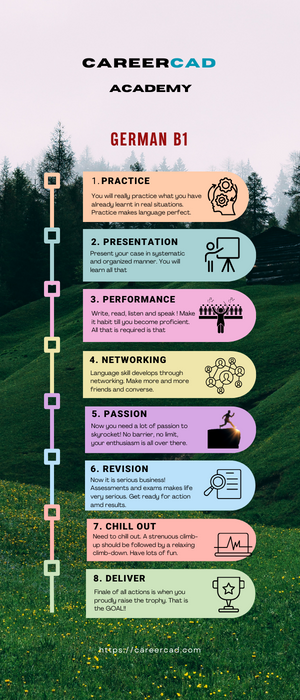CareerCAD Academy offers German language courses and examination coaching according to the standards of the the Common European Framework of Reference for Languages (CEFR). German Certification courses include: German A1-2-Level Beginner Courses, B1-2-Level Intermediate Courses, and C1-C2-Level Advanced Courses. Specialized Medical German courses are provided for healthcare professionals (both medical and paramedical) to enhance their profession-specific language skills, particularly medical terms and terminology, commonly encountered phases and usages, and context-specific communication. Here’s a brief overview of the course structure of each program:
The German A1 course, according to the Common European Framework of Reference for Languages (CEFR), is designed for beginners and covers basic language skills. At this beginner level, you will learn to understand and use familiar, everyday expressions and very basic phrases. Here are the key details:
Listening (Hӧren): Understanding familiar words and very basic phrases concerning oneself, family, and immediate concrete surroundings when people speak slowly and clearly.
Reading (Lesen): Recognizing familiar names, words, and very simple sentences, for example on notices and posters or in catalogs.
Speaking (Sprechen): Interacting in a simple way provided the other person is prepared to repeat or rephrase things at a slower rate of speech and help is given with formulation. Can ask and answer simple questions in areas of immediate need or on very familiar topics.
Writing (Schreiben): Writing a short, simple postcard, for example sending holiday greetings. Can fill in forms with personal details, for example entering name, nationality, and address on a hotel registration form.
By completing the A1 level, learners can understand and use familiar everyday expressions and very basic phrases aimed at the satisfaction of needs of a concrete type. They can introduce themselves and others and can ask and answer questions about personal details such as where they live, people they know, and things they have.
The course is patterned against two Goethe exams: Zertifikat A1 – Deutsch 1 for children and young people and Zertifikat A1 – Deutsch 1 for adults. Both exams test listening, reading, writing, and speaking skills1.
These exams are recognized internationally and can serve as proof of language proficiency for various purposes, such as visa procedures, professional recognition, or university registration.


The A2 course is aligned with the second level (A2) on the six-level scale of competence laid down in the Common European Framework of Reference for Languages (CEFR). After the course, you will be able to understand sentences and commonly used expressions related to personal information, shopping, work, and immediate surroundings. You will be able to communicate in simple, routine situations and describe your background and education in a simple way. The course covers everyday communication, expressing opinions, and understanding basic written texts. It delves into grammar rules and expands vocabulary in meaningful contexts.
Listening (Hӧren): Understanding sentences and commonly used expressions related to areas of most immediate relevance (e.g., personal information, shopping, local geography, employment).
Reading (Lesen): Reading and comprehending short, simple texts on familiar matters.
Speaking (Sprechen): Communicating in simple and routine tasks requiring a simple and direct exchange of information on familiar and routine matters.
Writing (Schreiben): Writing short, simple notes and messages relating to matters in areas of immediate needs.
The A2 exam consists of these four parts, with each part worth 15 points, totaling 60 points. To pass the exam, you must score at least 36 points.
The course aims to help you make yourself understood in simple, routine situations and describe in a simple way aspects of your background, immediate environment, and matters in areas of immediate need.
The German B1 course is structured to develop independent language use and corresponds to the third level on the six-level scale of competence in the CEFR. The course covers the following areas:
Listening (Hӧren): After successfully completing B1 Level, you will be able to comprehend main points of information in conversations and audio material on familiar matters when clear, standard language is used. You will also gain insights into the cultural aspects of German-speaking countries and their people.
Reading (Lesen): You should be able to understand the main content of complex texts and grasp specific information and opinions from written material on familiar matters related to work, school, leisure, etc. You will have sound understanding of essential grammar rules and their application that help you in understanding contents of complex texts.
Speaking (Sprechen): You will be able to engage in clear, detailed conversations on a wide range of subjects and discuss personal interests, opinions, social issues, plans, and experiences. That is, you will acquire proficiency sufficient to express yourself effectively while interacting with natives of German-speaking countries.
Writing (Schreiben): Now you can write simple connected texts on familiar topics and describe your experiences and events. You should be able to use of complex sentences using a variety of connectors, tenses, and cases. You will also learn to use idiomatic expressions and colloquial language to a limited extent. You can now write letters, essays and reports for various personal and professional purposes.
Each of these skills is crucial for passing the B1 level examination, which is modular. All four skill aspects are treated as distinct skills. Duration of the course can vary depending on the intensity of the program. Normally at least 140 sessions (60 minutes each) are required for mastering the proficiency required for B1 level.


The German B2 course is the intermediate-advanced level designed for students who have already achieved a good proficiency in the language. The course aims to further enhance the students’ language skills, enabling them to understand and express complex ideas and arguments effectively. Here are the key details of the B2 course:
Course Objectives:
Comprehension: Understand the main content of complex texts on both concrete and abstract topics, including technical discussions in your specialization.
Communication: Engage in fluent and spontaneous conversation with native speakers without strain for either party.
Expression: Clearly and elaborately express opinions on current issues, explaining the pros and cons of different viewpoints.
Course Modules:
Listening (Hören): This module tests the ability to understand the main content of complex texts on concrete and abstract topics, including technical discussions in one’s area of specialization.
Reading (Lesen): Learners are assessed on their ability to read and understand texts on a wide range of topics, as well as to recognize implicit meaning.
Writing (Schreiben): Participants are required to produce clear and detailed text on a variety of subjects and explain their viewpoint on a topical issue, giving the advantages and disadvantages of various options.
Speaking (Sprechen): This section evaluates the ability to communicate spontaneously and fluently with native speakers without much obvious effort on either side, and to actively participate in discussions on familiar topics.
A written and oral examination is part of the assessment.
Receptive skills are tested through reading and listening comprehension tasks, as well as a language elements section.
Productive skills are assessed through written and oral tasks, where test takers respond to specific input in written or spoken form.
Passing the exam demonstrates that you can understand and express yourself clearly on a range of topics and engage in discussions with native speakers.

Copyright © 2024 CareerCAD All Right Reserved